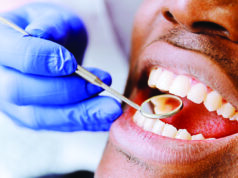Qn1. What is prostate cancer and what are the causes?
- The prostate is a small walnut-shaped gland in men that produces the seminal fluid that nourishes and transports sperm. Prostate cancer is malignant (abnormal) growth of cells in the prostate gland. Prostate cancer is the second commonest cause of cancer-related death in men worldwide. In Uganda, prostate cancer is the commonest cancer among men with an age-standardized incidence rate for prostate cancer of 39.6 per 100,000, which is one of the highest rates observed in Africa. The median age at which Ugandan men are diagnosed with prostate cancer is 70 years, which is similar to the age at which most African American men are diagnosed (African Journal of Urology, Dec. 2013).
Causes of prostate cancer
Researchers do not know exactly what causes prostate cancer. But they have found some risk factors and are trying to learn just how these factors cause prostate cells to become cancer. On a basic level, prostate cancer is caused by changes in the DNA of a normal prostate cell. DNA is the chemical in our cells that makes up our genes. Our genes control how our cells function. Some genes control when our cells grow, divide into new cells, and die.
Certain genes that help cells grow, divide, and stay alive are called oncogenes. Genes that normally keep cell growth under control, repair mistakes in DNA, or cause cells to die at the right time are called tumor suppressor genes. Cancer can be caused in part by DNA changes (mutations) that turn on oncogenes or turn off tumor suppressor genes. Some gene mutations have been implicated in prostate cancer. DNA changes can either be inherited from a parent or can be acquired during a person’s lifetime.
Qn2. Who exactly is at risk of getting prostate cancer?
- Age: Prostate cancer is rare in men younger than 40, but the threat of having prostate cancer rises rapidly after age 50. About six in 10 cases of prostate cancer are found in men older than 65.
Genetics: Men with a family history of prostate cancer have a higher risk of developing prostate cancer and are also likely to present 6-7 years earlier.
Race/ethnicity: Prostate cancer appears more in men of black race as compared to other races across the world.
Diet: Increased risk linked to increased fat intake.
Symptoms
Prostate cancer usually causes no symptoms until it reaches an advanced stage.
Initially, symptoms may include difficulty passing urine and a need to urinate frequently or urgently. Later, prostate cancer may cause bloody urine or a sudden inability to urinate. Other symptoms are as a result of the cancer spreading to other areas of the body, mainly the bones especially to the pelvis, ribs or vertebrae. Bone cancer tends to be painful and may weaken a bone enough for it to easily fracture. Spread to the bones of the spine (vertebrae) affects the spinal cord and can cause pain, numbness, weakness, or urinary incontinence.
Qn3. What are the chances of survival once one is diagnosed with prostate cancer?
The prognosis of men diagnosed with prostate cancer in Uganda is poor. Only 46.9 per cent will live five years after diagnosis compared to 98 per cent among African Americans. In the developed world, the probability of being diagnosed with cancer is more than twice as high as in developing countries. However, lower mortality is reported in developed countries due to early detection, while in developing countries, most cancer victims are diagnosed with late stage, incurable tumors, pointing to the need for better detection programs (African Journal of urology, Dec. 2013).
Qn4.Where in Uganda can one go for prostate cancer checkup?
- Health center IVs in Uganda can be starting point for prostate cancer screening, but diagnosis can be done in any of the general hospitals across the country. Following diagnosis and staging of the disease, the patient can be treated surgically by removing the Prostate gland if the cancer is still confined to the gland or referred to Uganda Cancer Institute in case the cancer has spread to distant areas of the body.
Qn 5. What other information must people know about prostate cancer?
- All men above 40 years of age should be going for regular checkup of the prostate gland for prostate enlargement. Prostate cancer can be healed if discovered early before spreading to other body parts.
INFERTILITY
Dear Dr, I am aged 42 and have been operated on twice because of fibroids. I don’t have children because I have failed to conceive naturally. Could I be infertile because of fibroids? Constance.
Dear Constance, Thank you for your question.
Fibroids are benign (non cancerous) tumors that grow from the cells of the uterus. Most women (about 75 per cent) have fibroids. Some are aware whereas others don’t know they have them, but conceive naturally. Fibroids may not necessarily cause infertility depending on where exactly on the uterus they are located. In some instances, fibroids may cause infertility if they are blocking the fallopian tubes or if they are interfering with the implantation of the embryos in the uterus. Operations due to fibroids are a major cause of failure to conceive as a result of formation of pelvic scars which involve the fallopian tubes. Also, fallopian tubes may be damaged during the operation and, hence, failure to conceive. It is important you do a hysterosalpingogram (HSG) test to examine fallopian tubes patency.
Other tests include (putting age in perspective):
Ovarian reserve (availability of eggs in the ovaries) check by doing hormonal tests, especially Follicle stimulating hormone and Estrogen hormone levels. Doing a pelvis ultrasound scan is also recommendable. At the age of 42, with a history of two previous fibroid surgeries, you will need to consider in vitro fertilization (IVF) treatment as the best way to conceive.






















